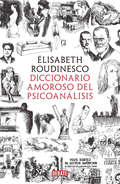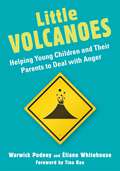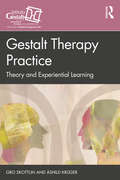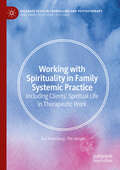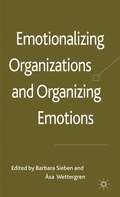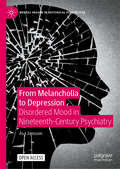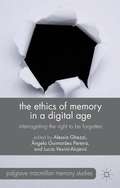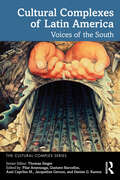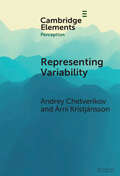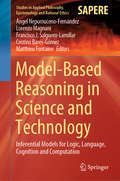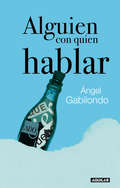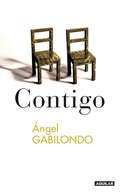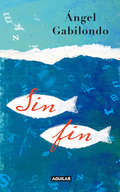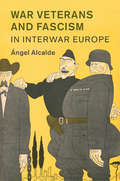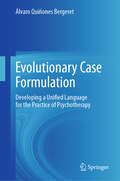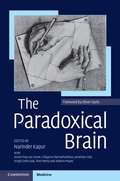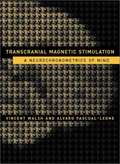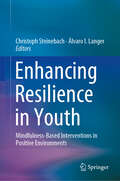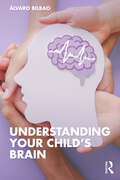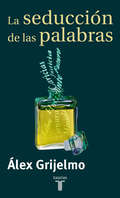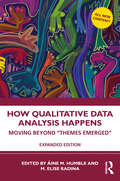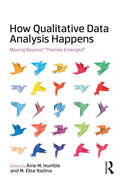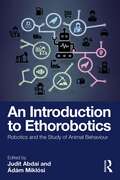- Table View
- List View
Diccionario amoroso del psicoanálisis
by Élisabeth RoudinescoUna vuelta por el mundo del psicoanálisis en 89 entradas. Entretenido y caprichoso, este Diccionario amoroso de Élisabeth Roudinesco invita a un recorrido fascinante: el que cruza al psicoanálisis como cultura a través de la historia, el cine, el arte, la geografía y las mitologías. El psicoanálisis, una suerte de nuevo mesianismo nacido en Viena a comienzos del siglo XX, se propuso encontrar una nueva tierra prometida: el inconsciente, la clínica de las neurosis y de la locura. Fenómeno urbano, representa una revolución de lo íntimo fundada en la actualización de los grandes mitos de la antigua Grecia. Anuncia que el hombre, aunque determinado por un destino, puede liberarse de sus cadenas pulsionales mediante una exploración de sí mismo, de sus sueños y sus fantasmas. ¿Una nueva medicina del alma? Sin duda, pero también un desafío al mundo de la racionalidad. Extraña disciplina, fue atacada por fanáticos religiosos, regímenes totalitarios y cientificistas preocupados por reducir al hombre a una suma de circunvoluciones cerebrales, al tiempo que era adulada por sus adeptos, cuyas jergas contribuyeron a menudo a degradarla. «En este Diccionario amoroso del psicoanálisis he adoptado el estilo de la lección -clasificar, reflexionar, distinguir, nombrar- a los efectos de explicarle al lector la forma en que el psicoanálisis se nutrió de literatura, de cine, de teatro, de viajes y de mitologías para llegar a ser una cultura universal. He atravesado ciudades y museos, me he encontrado con personajes, poemas y novelas [...] De Amor a Zurich, pasando por Animales, Buenos Aires, El segundo sexo, Sherlock Holmes, Hollywood, Marilyn Monroe, New York, Psique o Leonardo da Vinci, se encontrará aquí una lista de experiencias y palabras que permiten trazar la historia y la geografía de esta saga del espíritu en permanente metamorfosis.»
Freud
by Élisabeth RoudinescoÉlisabeth Roudinesco's bold reinterpretation of Sigmund Freud is a biography for the twenty-first century--a sympathetic yet impartial appraisal of a genius admired but misunderstood in his time and ours. Alert to tensions in his character and thought, she views Freud less as a scientific thinker than as an interpreter of civilization and culture.
Little Volcanoes: Helping Young Children and Their Parents to Deal with Anger
by Tina Rae Éliane Whitehouse Warwick PudneyYoung children can erupt like little volcanoes when they are feeling angry. It can be overwhelming and difficult to deal with, and can produce angry feelings in the parent or caregiver too. This book is packed with advice and strategies for those working with children under five on how to understand and manage anger in children, and also how to help their parents or caregivers to deal with anger. The authors outline the different reasons children may feel angry so that their emotions can be fully understood, and offer strategies to combat negative feelings and minimize outbursts. These include putting in place behavioural boundaries and helping a child to feel secure. Simple activities and exercises are also given to help children and adults to express their anger positively. In addition, a selection of poems and stories will help adults to pass on the lessons of the book to children. This practical and accessible book will be of essential use to any professional helper of parents and young children such as early childhood educators, caregivers and social workers, as well as to parents themselves.
Gestalt Therapy Practice: Theory and Experiential Learning (Gestalt Therapy Book Series)
by Gro Skottun Åshild KrügerThis essential new book gives the reader an introduction to the fundamental concepts of gestalt therapy in a stimulating and accessible style. It supports the study and practice of gestalt therapy for clinicians of all backgrounds, reflecting a practice-based pedagogy that emphasises experiential learning. The content in this book builds on the curriculum taught at the Norwegian Gestalt Institute University College (NGI). The material is divided into four main sections. In the first section, the theoretical basis for gestalt therapy is presented with references to gestalt psychology, field theory, phenomenology, and existential philosophy. In the later parts, central theoretical terms and practical models are discussed, such as the paradoxical theory of change, creative adjustment, self, contact, contact forms, awareness, polarities, and process models. Clinical examples illustrate the therapy form’s emphasis on the relational meeting between therapist and client. Detailed description of gestalt therapy theory from the time of the gestalt psychologists to today, with abundant examples from clinical practice, distinguishes this book from other texts. It will be of great value to therapists, coaches, and students of gestalt therapy.
Working with Spirituality in Family Systemic Practice: Including Clients' Spiritual Life in Therapeutic Work (Palgrave Texts in Counselling and Psychotherapy)
by Per Jensen Åse HolmbergSpirituality has offered people across cultures and continents a source of comfort and meaning for millennia and is closely connected to the human body through our emotions, our behaviour and our relationships. The concept today is considered broader than religion and can encompass our innate need for love, hope, values and direction in life. While spiritual belief can foster recovery and resilience in times of crisis, spiritual distress can also contribute to physical, emotional and relational problems. Despite its relevance, most family therapists are not trained to incorporate spiritual and religions issues in therapy. Based on the author’s extensive research on this topic, this book offers an overview of current theory as well as practical elements designed to help practitioners develop their spiritual literacy in their work with clients.
Emotionalizing Organizations and Organizing Emotions
by Barbara Sieben Åsa WettergrenDelivers a strong contribution to the field of research on emotions in organizations offering original pieces of research. Uniting scholars from organization and management research and sociology, it conveys trans-disciplinary insights into the multidimensional 'nature' of emotion and its appearance in organizational structures and processes.
From Melancholia to Depression: Disordered Mood in Nineteenth-Century Psychiatry (Mental Health in Historical Perspective)
by Åsa JanssonThis open access book maps a crucial but neglected chapter in the history of psychiatry: how was melancholia transformed in the nineteenth century from traditional melancholy madness into a modern biomedical mood disorder, paving the way for the emergence of clinical depression as a psychiatric illness in the twentieth century? At a time when the prevalence of mood disorders and antidepressant consumption are at an all-time high, the need for a comprehensive historical understanding of how modern depressive illness came into being has never been more urgent. This book addresses a significant gap in existing scholarly literature on melancholia, depression, and mood disorders by offering a contextualised and critical perspective on the history of melancholia in the first decades of psychiatry, from the 1830s until the turn of the twentieth century.
The Ethics of Memory in a Digital Age
by Alessia Ghezzi Ângela Guimarães Pereira Lucia Vesnić-AlujevićThis edited volume documents the current reflections on the 'Right to be Forgotten' and the interplay between the value of memory and citizen rights about memory. It provides a comprehensive analysis of problems associated with persistence of memory, the definition of identities (legal and social) and the issues arising for data management.
Cultural Complexes of Latin America: Voices of the South (The Cultural Complex Series)
by Thomas Singer Pilar Amezaga Gustavo Barcellos Áxel Capriles M Jacqueline Gerson Denise G. RamosCultural Complexes of Latin America: South and the Soul explores the theory and embodied reality that cultural complexes are powerful determinants in the attitudes, behaviour, and emotional life of individuals and groups. The contributing authors, all from several Latin American countries, present compelling historical, anthropological, sociological, mythological, psychological, and personal perspectives on a part of the world that is full of promise and despair. Latin America is a region marked with psychic "fault lines" that cause disturbances in its populations on issues of social class, ethnicity, race, religion, gender, and even geography. Many of these "fault lines" appear to have their origins in the "basic fault" that occured with the conquest and colonization of the region, primarily by the Spanish and Portuguese. This "basic fault" and its subsequent "fault lines" reside not only in various groups that compete for status, power, wealth, and meaning but in the psyche of every Latin American individual who carries the emotional memories and scars of conflicts that have coursed through their mixed blood for generations.
Representing Variability: How Do We Process the Heterogeneity in the Visual Environment? (Elements in Perception)
by Andrey Chetverikov Árni KristjánssonThe visual world is full of detail. This Element focuses on this variability in perception, asking how it affects performance in visual tasks and how the variability is represented by human observers. The authors highlight different methods for assessing representations of variability and suggest that understanding visual variability can be elusive when straightforward explicit methods are used, while more implicit methods may be better suited to uncovering such processing. The authors conclude that variability is represented in far more detail than previously thought and that this aspect of perception is vital for understanding the complexity of visual consciousness.
El valor terapéutico del humor (3a edicion)
by Ángel Rodríguez IdigorasEl humor es algo consustancial al ser humano. Tiene que ver con sus raíces antropológicas y presenta múltiples manifestaciones en muy diversos ámbitos y formas de expresión. Este libro quiere, por un lado, subrayar el valor terapéutico del humor, que el humor cura, sana y nos integra. Y, por otro, introducirnos en la psicoterapia y en los diversos enfoques que tienen por objeto sanar y aliviar el dolor humano y ver cómo se está utilizando el humor en este campo. Está escrito por expertos de la salud, de la educación y del humor mismo. Los trabajos, planteados con rigor y al mismo tiempo con un notable afán de divulgación, profundizan en los enfoques terapéutico, médico, educativo y patológico. Esperamos que sea una invitación tanto a especialistas como a lectores en general a contemplar el humor de una manera fresca y a practicarlo con uno mismo y con los demás.
Model-Based Reasoning in Science and Technology: Inferential Models for Logic, Language, Cognition and Computation (Studies in Applied Philosophy, Epistemology and Rational Ethics #49)
by Lorenzo Magnani Ángel Nepomuceno-Fernández Francisco J. Salguero-Lamillar Cristina Barés-Gómez Matthieu FontaineThis book discusses how scientific and other types of cognition make use of models, abduction, and explanatory reasoning in order to produce important and innovative changes in theories and concepts. Gathering revised contributions presented at the international conference on Model-Based Reasoning (MBR18), held on October 24–26 2018 in Seville, Spain, the book is divided into three main parts. The first focuses on models, reasoning, and representation. It highlights key theoretical concepts from an applied perspective, and addresses issues concerning information visualization, experimental methods, and design. The second part goes a step further, examining abduction, problem solving, and reasoning. The respective papers assess different types of reasoning, and discuss various concepts of inference and creativity and their relationship with experimental data. In turn, the third part reports on a number of epistemological and technological issues. By analyzing possible contradictions in modern research and describing representative case studies, this part is intended to foster new discussions and stimulate new ideas. All in all, the book provides researchers and graduate students in the fields of applied philosophy, epistemology, cognitive science, and artificial intelligence alike with an authoritative snapshot of the latest theories and applications of model-based reasoning.
Alguien con quien hablar
by Ángel GabilondoAlguien con quien hablar no pretende ser una lección ni darla. Lejos de la sofisticación académica, desea ofrecerse como un acto de comunicación esencialmente humano. Todos necesitamos que alguien nos acompañe, que esté cerca, que nos escuche, que nos diga. Pero alguien no es uno o una cualquiera, no nos es indiferente, y dar con él, con ella, resulta decisivo. Tal vez se trate más de una capacidad de atender, de escuchar, de estar abierto y dispuesto, no sólo a recibir, sino a entregarse, a darse. Y dejar hablar no es un simple gesto de permisividad, es un acto de reconocimiento. Exige crear condiciones, un territorio propicio, para la palabra ajena. De la amistad y el sexo, del placer, el deseo y el erotismo, de la mentira, el malentendido o el silencio, de la serenidad y la alegría nos habla Ángel Gabilondo, entre otros temas, dibujando un espacio de encuentro en el que la palabra es protagonista.
Contigo
by Ángel GabilondoÁngel Gabilondo recupera la palabra que nos falta, la que a menudo callamos, y nos anima a intensificar la pasión de buscar, de perseguir, de rememorar y de conformar una nueva posibilidad, una realidad diferente que nos acerque. «Contigo es menos difícil»Ángel Gabilondo No siempre encontramos las palabras adecuadas. En ocasiones éstas se desvanecen antes de llegar. Se produce entonces una sensación incómoda de incomunicación. Lamentamos no haber sido capaces de verbalizar lo que pensamos o sentimos. Todos necesitamos de alguien que nos hable, que nos abrace, que nos descubra. Convivir y compartir sin apenas decirnos nada acaba por impedir los sueños y los deseos que nos completan en compañía del otro. Contigo nos sitúa en el espacio donde se produce la ruptura entre lo que nos sucede y lo que decimos, en el entorno de aquello que nuestros labios se reservan, en el territorio de los encuentros que son también desencuentros. En él nos sorprenden los sueños y los deseos, las dudas, la incertidumbre, la añoranza y allí nos damos cuenta de que «contigo», con alguien, es todo menos difícil.
Sin fin
by Ángel GabilondoÁngel Gabilondo nos revela que hablar y escribir puede ser la creación constante de otras posibilidades, de otra realidad sin fin. «Los afectos son siempre una búsqueda»Ángel Gabilondo Este libro es una declaración, no una confesión. Aquí se expone una forma de vida que bien pudiera ser de cada uno de nosotros. No son fragmentos ni apuntes, son reflexiones completas de lo que podría decirse, que muestran una posición de afectos y de sentimientos, que a su vez son pensamiento, en una carta que no tiene final porque necesita de otro para ser escrita. Los afectos son siempre una búsqueda. Sin fin es la evidencia de que nos ocurre algo que a menudo nos desborda y que tiene que ver con lo que callamos -por pudor, por prudencia, por mantener nuestra intimidad-, con la pulsión que nos obliga a decir, a crear, a conocernos y a darnos cuenta de que hay ciertos asuntos que sOlo se conocen cuando se hablan. Avalado por la respuesta a sus anteriores obras, Alguien con quien hablar y Contigo, Ángel Gabilondo vuelve a promover en Sin fin la palabra honesta y certera, no solo para transmitirnos lo ya pensado, sino para sugerirnos lo que podemos llegar a pensar. Una obra que nos revela que hablar y escribir pueden ser además de una mera proyección de hechos, deseos o sentimientos la creación constante de otras posibilidades y, por encima de todo, de nosotros mismos.
War Veterans and Fascism in Interwar Europe (Studies in the Social and Cultural History of Modern Warfare #50)
by Ángel AlcaldeThis book explores, from a transnational viewpoint, the historical relationship between war veterans and fascism in interwar Europe. Until now, historians have been roughly divided between those who assume that 'brutalization' (George L. Mosse) led veterans to join fascist movements and those who stress that most ex-soldiers of the Great War became committed pacifists and internationalists. Transcending the debates of the brutalization thesis and drawing upon a wide range of archival and published sources, this work focuses on the interrelated processes of transnationalization and the fascist permeation of veterans' politics in interwar Europe to offer a wider perspective on the history of both fascism and veterans' movements. A combination of mythical constructs, transfers, political communication, encounters and networks within a transnational space explain the relationship between veterans and fascism. Thus, this book offers new insights into the essential ties between fascism and war, and contributes to the theorization of transnational fascism. Offers a Europe-wide transnational perspective on the complex phenomenon of fascism Analyzes the cultural, sociological and political origins of fascism and its proliferations across Europe Transcends the traditional paradigm of the 'brutalization' thesis and challenges conventional views of war veterans' identities and history
Evolutionary Case Formulation: Developing a Unified Language for the Practice of Psychotherapy
by Álvaro Quiñones BergeretThis book presents the Evolutionary Case Formulation model, a new proposal of case formulation protocol developed with the aim of providing psychotherapists with a common language to identify and treat psychological problems of varying complexity. This new case formulation model was developed based on the analysis of textual data in complete psychotherapeutic processes which led to the identification of different dimensions of intersubjective meaning elaboration that are a product of our evolution as a species. The Evolutionary Case Formulation model is based on a system of first and second order intersubjective knowledge domains. The first order knowledge domain is the Self System, which is ubiquitous in the processing of information and creation of individual meaning in a cultural intersubjective matrix. The second order knowledge domains are the different dimensions of intersubjective meaning elaboration: Cognition, Emotion, Interpersonal, Imagination, Corporeality, Sexuality and Religiosity/Spirituality. This system provides psychotherapists with a new conceptual framework to work with patients in the different stages of the psychotherapeutic process, from assessment to treatment planning and implementation. The book Evolutionary Case Formulation: Developing a Unified Language for the Practice of Psychotherapy, that the reader has in their hands, was first published in Spanish in 2021. This English edition is a fully revised and updated version of the original Spanish edition. More specifically, the case formulation protocol presents a series of innovations that are not present in the Spanish edition. In other words, it is a protocol that includes numerous clarifications in the intersubjective knowledge domains, making this book different. The original manuscript of this book was written in Spanish and translated into English with the help of artificial intelligence. The author (with the friendly support of a bilingual psychotherapist) has subsequently revised the text further in an endeavor to refine the work stylistically.
The Paradoxical Brain
by Oliver Sacks Álvaro Pascual-Leone Tom Manly Andrew Mayes Jonathan Cole Sergio Della Sala Narinder Kapur Vilayanur RamachandranThe Paradoxical Brain focuses on a range of phenomena in clinical and cognitive neuroscience that are counter-intuitive and go against the grain of established thinking. The book covers a wide range of topics by leading researchers, including: * Superior performance after brain lesions or sensory loss * Return to normal function after a second brain lesion in neurological conditions * Paradoxical phenomena associated with human development * Examples where having one disease appears to prevent the occurrence of another disease * Situations where drugs with adverse effects on brain functioning may have beneficial effects in certain situations A better understanding of these interactions will lead to a better understanding of brain function and to the introduction of new therapeutic strategies. The book will be of interest to those working at the interface of brain and behaviour, including neuropsychologists, neurologists, psychiatrists and neuroscientists.
Transcranial Magnetic Stimulation: A Neurochronometrics of Mind
by Stephen M. Kosslyn Vincent Walsh Álvaro Pascual-LeoneThe mainstays of brain imaging techniques have been positron emission tomography (PET), functional magnetic resonance imaging (fMRI), magnetoencephalography (MEG), and event-related potentials (ERPs). These methods all record direct or indirect measures of brain activity and correlate the activity patterns with behavior. But to go beyond the correlations established by these techniques and prove the necessity of an area for a given function, cognitive neuroscientists need to be able to reverse engineer the brain--i.e., to selectively remove components from information processing and assess their impact on the output. This book is about transcranial magnetic stimulation (TMS), a technique that emerged during the same period as neuroimaging and has made it possible to reverse engineer the human brain's role in behavioral and cognitive functions. The subject areas that can be studied using TMS run the gamut of cognitive psychology--attention, perception, awareness, eye movements, action selection, memory, plasticity, language, numeracy, and priming. The book presents an overview of historical attempts at magnetic brain stimulation, ethical considerations of the technique's use, basic technical and practical information, the results of numerous TMS studies, and a discussion of the future of TMS in the armamentarium of cognitive neuropsychology.
Enhancing Resilience in Youth: Mindfulness-Based Interventions in Positive Environments
by Christoph Steinebach Álvaro I. LangerThis book shows how to plan, refine, and implement peer-supported mindfulness-based interventions to prevent mental disorders in children and youths. It focuses on interventions designed to maintain psychosocial health and prevent emotional and behavioral problems in children and youths around the globe. By combining a range of research perspectives, the book connects mindfulness to pro-social behavior, and to positive social and physical environments, in order to enhance resilience. In addition, it presents theoretical aspects and practical recommendations on how to promote mental health and healthy lifestyles in adolescents, such as school-based interventions. Gathering contributions by an international network of researchers and practitioners, the book offers not only state-of-the-art theoretical descriptions of key concepts and interventions, but also best practices for implementing them to strengthen resilience.
Understanding Your Child's Brain
by Álvaro BilbaoUnderstanding Your Child's Brain simplifies the neuroscience behind what is going on in a child’s brain during the first six years of life to help parents develop the full intellectual and emotional potential of their children. The book starts with an accessible explanation of the pillars and principals to understanding the child’s brain. It then provides tools to helps parents communicate more effectively with, nurture empathy in, and enforce rules and positive behaviours for their children. Examining how to develop the emotional intelligence of children as well as their intellect, the chapters examine how to raise children based on trust, assertiveness, and fearlessness, while also providing support and exercises in improving language, memory, creativity, and self-control. This book offers parents and educators practical solutions to parenting problems and realistic advice for ensuring the healthy emotional and intellectual development of their children. It will also be relevant to all mental health professionals who want to be more assertive when talking to parents about their child’s problems and growth.
La seducción de las palabras
by Álex GrijelmoUn recorrido por las manipulaciones del pensamiento. Según qué palabras utilicemos así formaremos nuestro pensamiento. Desde la política, la publicidad, hasta el amor y la literatura, muchos intentan dominar los mecanismos de seducción verbal para así manipular el pensamiento ajeno. <P><P> Esta obra analiza con innumerables ejemplos cómo se manipulan hoy en día los vocablos para alterar la percepción que tenemos de la realidad, cómo se emplea su fuerza o su sutileza para engatusar a los demás.
How Qualitative Data Analysis Happens: Moving Beyond “Themes Emerged”
by Áine M. Humble M. Elise RadinaHow Qualitative Data Analysis Happens: Moving Beyond “Themes Emerged”, offers an in-depth look into how qualitative social science researchers studying a wide range of human experiences and dynamics approach their data analyses. This expanded edition consists of 13 new chapters from a broad range of disciplines (and an added conclusion) that document the stories about how qualitative data analysis occurred.Chapters for this expanded edition represent a diversity of disciplines (e.g., criminology, family science, education, health, nutrition, sociology, sport psychology) that focus on the human experience and describe a diversity of methodological approaches. These chapters may be used to introduce readers to newer or innovative ways of analysing data. It moves beyond the usual vague statement of “themes emerged from the data” to show readers how researchers actively and consciously arrive at their themes and conclusions, revealing the complexity and time involved in making sense of thousands of pages of interview data, multiple data sources, and diverse types of data. The various authors provide detailed narratives into how they analysed their data from previous publications. The methodologies range from arts-based research, autoethnography, community-based participatory research, ethnography, grounded theory, to narrative analysis. The volume allows readers to be seemingly “in the room” with these international scholars (representing Canada, the US, Austria, Germany, the UK, and the Philippines) and getting their own hands vicariously dirty with the data.This expanded edition also includes a conclusion chapter, in which the authors reflect on commonalities across the chapters. Supplemental figures, images, and screenshots, which are referred to in the chapters, are included in an accompanying eResource (that can be accessed at www.routledge.com/ 9781032183213), as well as links to the previously published work on which the chapters are based. This book is an invaluable resource for experienced and novice qualitative researchers throughout the social sciences, as well as undergraduate and postgraduate students in the field.
How Qualitative Data Analysis Happens: Moving Beyond "Themes Emerged"
by Áine Humble Elise RadinaWinner of the 2020 Anselm Strauss Award for Qualitative Family Research, National Council on Family Relations. How is qualitative data actually collected, analyzed, and accomplished? Real stories of How Qualitative Data Analysis Occurs: Moving Beyond "Themes Emerged" offers an in-depth look into how qualitative social science researchers studying family issues and dynamics approach their data analyses. It moves beyond the usual vague statement of "themes emerged from the data" to show readers how researchers actively and consciously arrive at their themes and conclusions, revealing the complexity and time involved in making sense of thousands of pages of interview data, multiple data sources, and diverse types of data. How Qualitative Data Analysis Occurs focuses on a diversity of topics in family research across the life course. The various authors provide detailed narratives into how they analyzed their data from previous publications, and what methodologies they used, ranging from arts-based research, autoethnography, community-based participatory research, ethnography, grounded theory, to narrative analysis. Supplemental figures, images, and screenshots which are referred to in the chapters, are included in an accompanying eResource, as well as links to the previously published work on which the chapters are based. This book is an invaluable resource for experienced and novice qualitative researchers throughout the social sciences.
An Introduction to Ethorobotics: Robotics and the Study of Animal Behaviour
by Ádám Miklósi Judit AbdaiThis pioneering text explores the emerging discipline of ethorobotics which brings together the fields of animal behaviour and robotics. It encourages closer collaboration between behavioural scientists and engineers to facilitate the creation of robots with a higher degree of functionality in animal/human environments and to broaden understanding of animal behaviour in new and intriguing ways.Utilising the knowledge of key ethologists and roboticists in the field today, this book is divided into four major parts. The first part is written for those with little or no background in the biology of animal behaviour, particularly for those coming from an engineering background seeking an accessible introduction to the field and how it can be applied to robotic behaviour. Topics include problem solving in animals, social cognition, and communication (visual, acoustic, olfactory, etc.). The second part is an introduction to the basic construction of robots for non‑engineers, and the possibilities offered by current technical achievements and their limitations to the study of animal behaviour. The third part explores the core theme of ethorobotics, the basic framework of the discipline, the field’s evolution, and current topics including ethical considerations, autonomy, to ‘living’ social robots. The fourth and final chapter looks at ethorobotics in practice through key research projects which have had the biggest impact.This is a ground‑breaking interdisciplinary text which will appeal to upper‑level undergraduates, postgraduates, and researchers focusing on animal behaviour and cognition, as well as those undertaking courses in engineering, social robotics, biologically inspired robotics, AI, and human–robot and animal–robot interactions.
